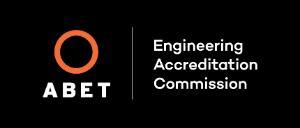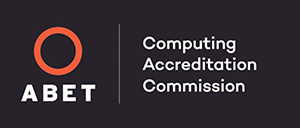ABET Accreditation
Programmatic accreditation information for the Bachelor of Science degree in Ocean Engineering.
Engineering And Computer Science Programs Accreditation
 ABET
ABET
The Aerospace Engineering (Bachelor of Science) program is accredited by the Engineering Accreditation Commission of ABET, https://www.abet.org, under the General Criteria and the Program Criteria for Aerospace and Similarly Named Programs.
The Biomedical Engineering (Bachelor of Science) program is accredited by the Engineering Accreditation Commission of ABET, https://www.abet.org, under the General Criteria and the Program Criteria for Bioengineering, Biomedical and Similarly Named Engineering Programs.
The Chemical Engineering (Bachelor of Science) program is accredited by the Engineering Accreditation Commission of ABET, https://www.abet.org, under the General Criteria and the Program Criteria for Chemical, Biochemical, Biomolecular and Similarly Named Engineering Programs.
The Civil Engineering (Bachelor of Science) program is accredited by the Engineering Accreditation Commission of ABET, https://www.abet.org, under the General Criteria and the Program Criteria for Civil and Similarly Named Engineering Programs.
The Computer Engineering (Bachelor of Science) program is accredited by the Engineering Accreditation Commission of ABET, https://www.abet.org, under the General Criteria and the Program Criteria for Electrical, Computer, Communications, Telecommunication(s) and Similarly Named Engineering Programs.
The Electrical Engineering (Bachelor of Science) program is accredited by the Engineering Accreditation Commission of ABET, https://www.abet.org, under the General Criteria and the Program Criteria for Electrical, Computer, Communications, Telecommunication(s) and Similarly Named Engineering Programs.
The Mechanical Engineering (Bachelor of Science) program is accredited by the Engineering Accreditation Commission of ABET, https://www.abet.org, under the General Criteria and the Program Criteria for Mechanical and Similarly Named Engineering Programs.
The Ocean Engineering (Bachelor of Science) program is accredited by the Engineering Accreditation Commission of ABET, https://www.abet.org, under the General Criteria and the Program Criteria for Naval Architecture, Marine Engineering, Ocean Engineering, and Similarly Named Engineering Programs.
The Software Engineering (Bachelor of Science) program is accredited by the Engineering Accreditation Commission of ABET, https://www.abet.org, under the General Criteria and the Program Criteria for Software and Similarly Named Engineering Programs.
The Computer Science (Bachelor of Science) program is accredited by the Computing Accreditation Commission of ABET, https://www.abet.org, under the General Criteria and the Program Criteria for Computer Science and Similarly Named Computing Programs.
Information Related to Programmatic Accreditation
Departmental Mission Statement
Our mission is to integrate oceanography, marine biology, ocean engineering, environmental science, ecology, meteorology, remote sensing, sustainability, and related academic endeavors into an interdisciplinary search for solutions to vital contemporary issues through education, research and service. Directions in the department mirror the interests of the faculty. The spectrum of approaches in the department ranges from using the scientific method to understand particular phenomena to a more applied approach of solving specific problems. An important goal is to provide policy recommendations to improve our quality of life.
Educational Objectives & Student Outcomes for the B.S. in Ocean Engineering Program
Program educational objectives for the B.S. in Ocean Engineering at Florida Tech
- Academic fundamentals: Graduates have successfully applied and integrated their knowledge of fundamental principles in their chosen career related to Ocean Engineering.
- Engineering practice: Graduates have used their engineering skills in the successful completion of an engineering project in the main stems of Florida Tech Ocean Engineering: coastal processes, hydrographic engineering, materials and structures, instrumentation, naval architecture, and ocean systems/underwater technology.
- Teamwork and communication: Graduates have demonstrated the ability to communicate their ideas and technical results verbally, in writing and via presentations, and are effective team members.
- Professional development: Graduates have advanced their knowledge and contributed to the profession and society.
Student outcomes for the B.S. in Ocean Engineering program at Florida Tech
- an ability to identify, formulate, and solve complex engineering problems by applying principles of engineering, science, and mathematics
- an ability to apply engineering design to produce solutions that meet specified needs with consideration of public health, safety, and welfare, as well as global, cultural, social, environmental, and economic factors
- an ability to communicate effectively with a range of audiences
- an ability to recognize ethical and professional responsibilities in engineering situations and make informed judgments, which must consider the impact of engineering solutions in global, economic, environmental, and societal contexts
- an ability to function effectively on a team whose members together provide leadership, create a collaborative and inclusive environment, establish goals, plans tasks, and meet objectives
- an ability to develop and conduct appropriate experimentation, analyze and interpret data, and use engineering judgment to draw conclusions
- an ability to acquire and apply new knowledge as needed, using appropriate learning strategies
Enrollment and Graduation Data for the B.S. in Ocean Engineering Program
Annual student enrollment and graduation data for the B.S. in the Ocean Engineering program are provided by Florida Tech’s Office of Institutional Research.


 Give to Florida Tech
Give to Florida Tech 